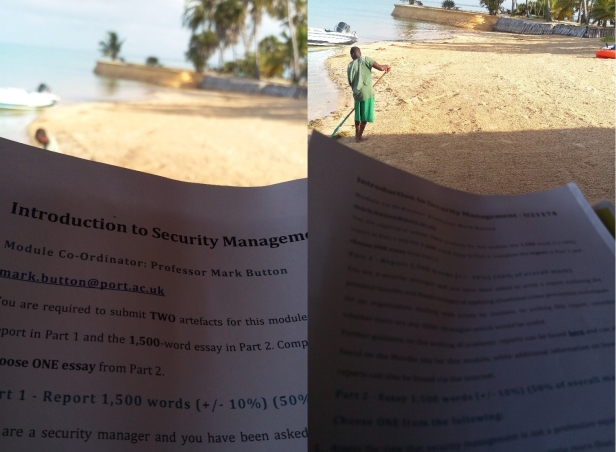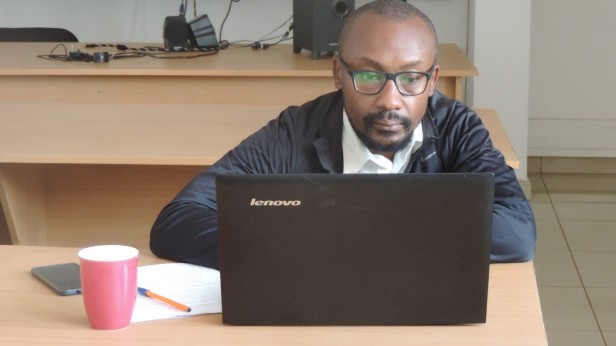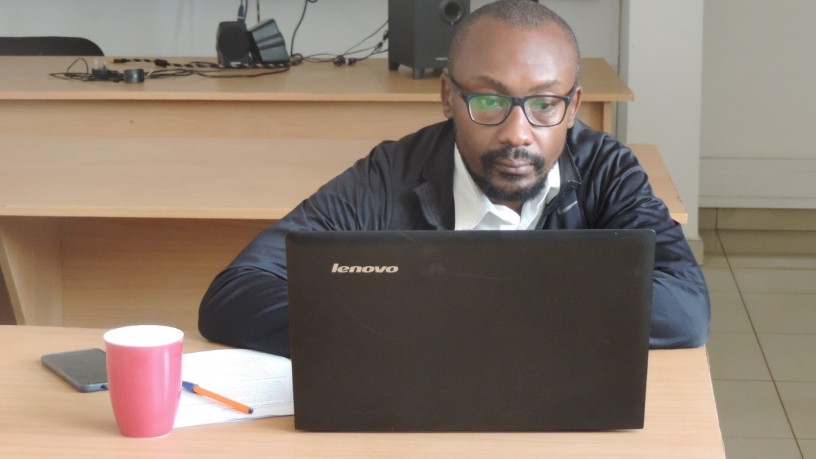Peter is a Security Professional and Instructor with a background in Close Protection. Before joining the Private Security Industry, he worked with the Ministry of State for Defense, Kenya for 12 years. He was deployed at Kahawa Garrison and later at Defense Headquarters. He developed a passion for Close Protection and left for training courses in South Africa, Israel and Poland. After leaving the Government, he joined a Risk and Security Management company and was in the frontline in developing and delivering the first ever Close Protection course in the Private Security Industry in East and Central Africa. Peter has been recognized as a Nominated Tutor (24491) for L2 & L3 Security Courses by Highfields Awarding Body for Compliance and City and Guilds in UK.
Where do you study?
I mostly study in two places.
Home – 80 percent of my study happens late into the night and when I am off duty the next day or over the weekends. I can enjoy the quiet of the night and the fact that am denying myself sleep puts me under pressure to utilise the time well. I am also able to put in long hours at night due to minimal distractions.
Work – 20 percent of my study happens at work or when am deployed away from home as a CPO. After duty, whether in hotel accommodations or camps manning posts, I put in a few hours to keep up the consistency of study like image 1 below is when I was deployed to a remote island off the Kenyan Coast looking after a British family on holiday.

What is your drink of choice during your study time?
As a teetotaler, my drink of choice always is coffee to keep warm and awake at night and maintain alertness.
What is your approach to studying a module?
Reading through – Firstly what I call a helicopter view by reading any guides to the module including the learning aims, outcomes and requirements. Then skimming loosely over all the Moodle chapters to get a feel of flow.
Reading through – Firstly what I call a helicopter view by reading any guides to the module including the learning aims, outcomes and requirements.
Preparing reading materials – Secondly arranging the chapters carefully by folders and inserting recommended reading from each. This can be seen in Image 2 below.

Assessments overview – Thirdly reading the assessment guide and creating a blank draft to be carefully edited as I reread the Moodle more keenly.
Note taking – Fourthly, note taking by concentrating on single chapter reading and understanding all content and comparing different sources on the same topic, with the assessment draft in mind and inserting my interpretations. Whenever possible, I insert cited texts.
Artefact writing – Lastly and my favourite part, writing the assessment with dedicated grasp of content to the best of my understanding.
Revision – Reviewing further sources and rereading if there is time and adding value to artefact continuously.
How do you manage your study time?
As a busy professional I appreciate the need to develop effective time management skills around my schedules. Taking into account my work, family and other commitments, I determine what time of day am most able to focus on my academic work. I am a night owl and prefer disruption free study at night.
One of the advantages of self-paced, distance learning courses is that you can study around your lifestyle. I dedicate at least a weekly total of 10 – 20 hours on a 5 days per week ratio of night study.
One of the advantages of self-paced, distance learning courses is that you can study around your lifestyle.
On some days, when highly motivated that I will sleep afterwards with no worry of work next day, I can put in over 4 hours continuously with short breaks in between. However, balancing work, family and personal leisure time to distance learning study requires a lot of dedication and discipline.
What part of studying do you enjoy the most?
Writing and figuring out artefacts is my favourite part of study and receiving results and feedback afterwards. I prefer a bottom to top approach to study of module requirements by understanding assessment questions from the start.
In the first few days of an opening of a module I dedicate time to outlining artefacts in required formats from my initial helicopter view of a module. Usually its never near the final submission but it encourages me to figure out by finding, reading and making notes from sources relevant to artefact.
With each passing week I keep attempting the artefact in small bits with whatever additional understanding I possess. This eventually clears up towards the end leading me to a better and constantly refined content as my insight improves from the initial attempt, rather than wait and write it all at the end.
What helps you study?
Mostly silence and the near zero distraction of the night helps me study effectively. I am least worried that someone will call me or be tempted by the options of day study like meeting friends impulsively.
Also being motivated that someday my two boys (8 and 4 y/o) will study in the UK someday keeps me going with this degree as how can I encourage them to have what I don’t know about. It is solely a huge contributor to this degree in the first place apart from climbing the ladder at work.
What impact have your studies had on your professional life?
From the few modules so far, my mindset and way of doing things at work has changed. I am no longer asking the usual question every employee asks, “what can my employer give me”, rather am now asking, “what can I give my employer”.
From the few modules so far, my mindset and way of doing things at work has changed.
As a support instructor, I asked my line supervisor, who is the MD of the regional office, if my department had a strategic plan. He was surprised and asked me to write one. I am sure by completion of the degree I will a better person career wise.



This is one of the best study plans I have come across,so on point and well thought out,far much better from what I have used before,I will adopt this for my school work.Thanks Peter for Sharing.Bless!!
LikeLiked by 1 person
So pleased that you have found this helpful, George. I will make sure Peter knows this. – Jo.
LikeLike